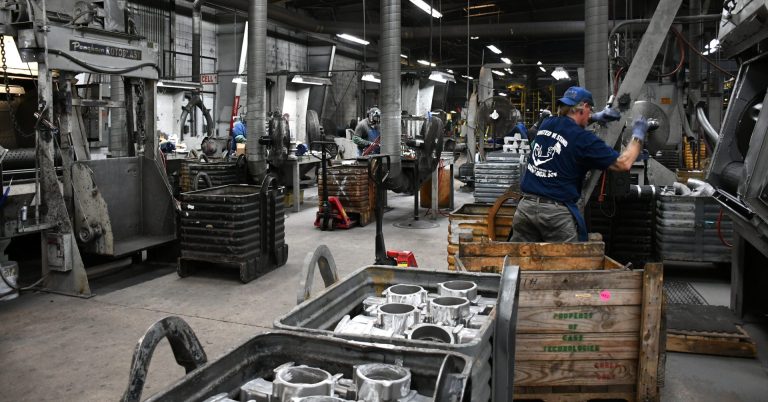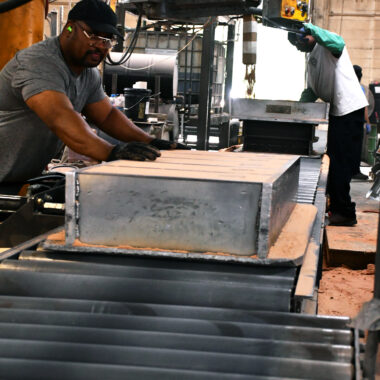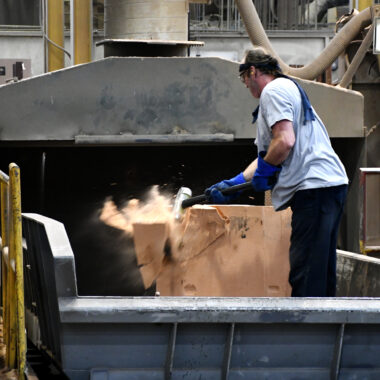Casting Aluminum Proficiency: Unleash Your Imaginative Potential
Casting Aluminum Proficiency: Unleash Your Imaginative Potential
Blog Article
The Clear-cut Handbook on Light Weight Aluminum Casting Services
As sectors proceed to demand precision and high quality, understanding the nuances of light weight aluminum casting procedures becomes vital. As we navigate via this conclusive manual, uncovering industry fads and innovations that shape the landscape of aluminum spreading solutions, we are reminded of the unlimited opportunities that await those eager to submerse themselves in this elaborate craft.

Understanding Light Weight Aluminum Spreading Procedures
Discovering the complexities of aluminum casting procedures exposes the accuracy and intricacy associated with transforming liquified steel into intricate elements - casting aluminum. Aluminum spreading is a precise production approach that includes the putting of liquified light weight aluminum into a mold and mildew to produce a preferred shape. This procedure begins with the precise preparation of the mold, which need to be crafted with accuracy to make certain the end product's precision. As soon as the mold prepares, the aluminum is warmed to its melting point and put into the mold and mildew cavity.
During the cooling process, the light weight aluminum strengthens and takes the form of the mold. What complies with is precise craftsmanship to remove any flaws and refine the part to meet the required specs. This procedure demands an eager eye for information and a deep understanding of metallurgy to ensure the end product's high quality and stability.
Recognizing the subtleties of light weight aluminum casting processes is vital for creating premium components that meet market requirements and demands. From aerospace to automotive sectors, the accuracy of light weight aluminum casting plays an important function in manufacturing durable and reliable components.
Vital Tools and Tools
What tools and tools are essential for attaining accuracy and performance in aluminum spreading processes? To guarantee effective light weight aluminum spreading, a number of necessary tools and devices are called for. Crucible heating systems play an important function in melting the aluminum alloys, offering the liquified steel essential for spreading. Crucibles made from products like clay graphite or silicon carbide are generally used as a result of their high warmth resistance. Furthermore, a ladle is essential for transferring the liquified metal from the heater to the molds precisely. Air flow systems are crucial to eliminate any type of fumes or gases created throughout the spreading procedure, making certain a risk-free workplace. Molds, made from materials such as sand or steel, are required to form the molten steel right into the desired kind. Various other devices like tongs, pouring containers, and cooling down chambers are also crucial for handling the liquified steel and guaranteeing proper solidification. By using these devices and tools successfully, aluminum casting services can attain high precision and performance in their procedures.
High Quality Control in Aluminum Casting
Making sure constant quality requirements is vital in light weight aluminum casting processes to satisfy industry demands and client assumptions. Quality control in aluminum spreading includes an organized approach to monitoring and reviewing every stage of the casting procedure to guarantee the last item's stability. To attain this, different techniques are utilized, such as visual assessments, dimensional checks, non-destructive screening, and material analysis. Aesthetic examinations are conducted to recognize surface area issues like cracks, porosity, or incomplete loads. Dimensional checks make certain that the casting satisfies accurate requirements. Non-destructive screening techniques like X-ray, ultrasonic, or color penetrant evaluations can identify inner flaws without harming the component. Product evaluation via spectroscopy or chemical testing validates the composition of the light weight aluminum alloy made use of (casting aluminum). By executing stringent high quality control procedures, aluminum casting company can provide elements that follow the highest possible criteria of efficiency, high quality, and reliability, ultimately pleasing both sector guidelines and client needs.

Maximizing Effectiveness and Efficiency
To enhance functional efficiency in light weight aluminum spreading solutions, optimizing efficiency and productivity is critical for conference production needs and maintaining affordable advantage in the industry. Applying lean production principles, such as reducing waste and simplifying procedures, can dramatically enhance total effectiveness. Utilizing advanced modern technology, like computer-aided layout (CAD) software program and automated systems, can boost performance by minimizing hands-on labor and increasing accuracy.

Collaborating carefully with suppliers to make certain a constant flow of top notch products and applying durable organizing and stock administration systems are also essential approaches for optimizing effectiveness in light weight aluminum spreading solutions. By concentrating on these areas, business can attain higher levels of efficiency, fulfill consumer demands properly, and stay ahead in a competitive market.
Market Fads and Advancements
In feedback to the evolving landscape of aluminum casting services, staying abreast of sector fads and technologies is critical for preserving an one-upmanship and meeting the vibrant needs of the market. One significant trend in the aluminum spreading market is the enhancing concentrate on sustainability and environmental duty. Firms are adopting greener techniques, such as making use of redirected here recycled aluminum and implementing energy-efficient procedures, to straighten with customer assumptions and regulatory requirements.
Additionally, improvements in innovation are revolutionizing aluminum casting processes. The integration of automation, robotics, and fabricated knowledge is enhancing manufacturing, improving precision, and reducing lead times. top article 3D printing is likewise making waves in the market by enabling intricate geometries to be produced with greater efficiency and cost-effectiveness.
Furthermore, there is a growing focus on customization and product personalization. With consumers looking for one-of-a-kind and customized items, aluminum casting services are adjusting to use more flexible manufacturing services. By embracing these sector patterns and innovations, companies can position themselves for success in a swiftly evolving market.
Conclusion
To conclude, the manual on light weight aluminum spreading solutions supplies an extensive overview of the processes, devices, high quality control measures, efficiency strategies, and sector patterns in the area. By understanding these crucial elements, services can boost their casting processes, make sure high-grade items, and stay competitive out there. This clear-cut handbook works as an important source for those associated with light weight aluminum casting services.
As industries continue to require precision and quality, understanding the nuances of light weight aluminum casting procedures becomes vital (casting aluminum). Aluminum casting is a precise production approach that includes the putting of molten light weight aluminum into a mold to create a preferred shape.Ensuring constant quality criteria is critical in light weight aluminum casting processes to meet sector demands and consumer assumptions. Quality control in aluminum casting entails a methodical technique to monitoring and examining every phase of have a peek at this website the spreading procedure to assure the last item's integrity.In conclusion, the handbook on aluminum spreading services supplies an extensive introduction of the procedures, devices, quality control procedures, effectiveness approaches, and sector trends in the area
Report this page